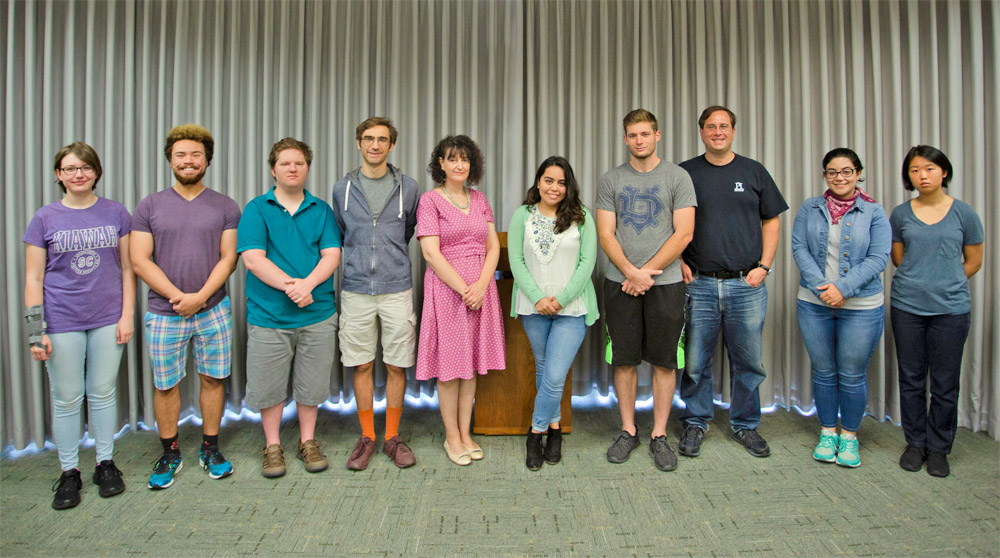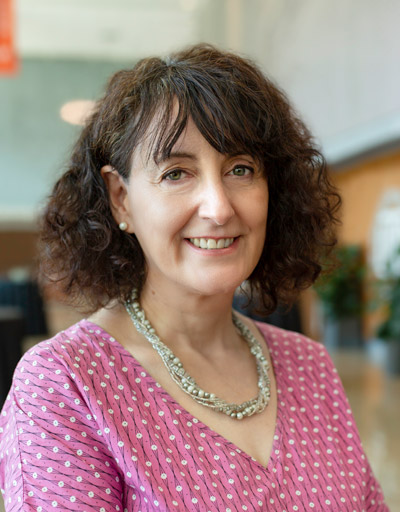
Dr. Lindsay King (fifth from left) and Dr. Michael Kesden (third from right) worked with the participants of the Department of Physics’ Research Experiences for Undergraduates internship program this summer.
The Department of Physics at The University of Texas at Dallas enjoyed a summer under the microscope, showing students from across America their cutting-edge work.
Six undergraduates spent 10 weeks at UT Dallas as part of the National Science Foundation’s Research Experiences for Undergraduates (REU), an internship program hosted by the department for the first time. The program is funded by a three-year, $266,961 grant from the foundation. Two other undergrads — Victoria Catlett, a Clark Scholar from UT Dallas, and Xingyi Wang, a Reed Scholarship recipient from Reed College in Portland, Oregon — participated in the program without funding from the foundation.
2018 REU Physics Participants
Patrick Adams
Haverford College
Victoria Catlett
UT Dallas
(Clark Scholar)
Niyousha Davachi
UT Arlington
Joseph Griesbauer
University of Dallas
Kyle Hamer
Louisiana State University
Alexandria Mendoza
McMurry University
Logan Stuart
Grinnell College
Xingyi Wang
Reed College
(Reed Scholarship)
Dr. Lindsay King, an associate professor in the School of Natural Sciences and Mathematics, was the principal investigator for the program, which focused on experimental and theoretical topics in biophysics, computational physics, condensed matter physics and astrophysics. Dr. Michael Kesden and Dr. Jason Slinker were the co-principal investigators.
King emphasized the importance of giving undergraduate students a meaningful research experience that instills the excitement of a career in science.
“The research experiences I had while an undergraduate at Cambridge were more limited,” King said. “There weren’t as many opportunities. But the ones that I did have were very formative for me.”
The abilities nurtured during the program go beyond research applications — particularly the teamwork, problem-solving and communication skills that participants hone while working within a mentor’s research group both independently and alongside graduate students.
“The skills you develop doing research can often be essential for many forms of employment, whether it’s collaboration, navigating discussions, or resolving differences,” King said. “Students that have been through UT Dallas but haven’t gone to grad school tell me that their practical experience here has been very helpful, from those going into industry to those who have become teachers.”
Logan Stuart, who studies at Grinnell College in Iowa, researched novel materials for superconductors under Dr. Bing Lv. His biggest takeaway was experiencing what it means to do experimental physics research.
“You can get a degree in physics and have no idea what physics work is. You go to class and you learn that content, but you don’t learn what people do,” he said. “My research is in solid state superconductors, and I’m learning so much about the field. This way, I can determine whether or not I want to pursue physics research later in life.”
Patrick Adams, who attends Haverford College in Pennsylvania, studied tidal disruption events — in which the black hole at a galaxy’s center tears a star apart — with Kesden. He enjoyed his first experience with theoretical research.

“Students that have been through UT Dallas but haven’t gone to grad school tell me that their practical experience here has been very helpful, from those going into industry to those who have become teachers.”
Dr. Lindsay King, an associate professor in the School of Natural Sciences and Mathematics
“In the past, I’ve done experimental work — analyzing a data set, building circuits,” he said. “Now, I’m studying these physical concepts, trying to model what’s at the center of the galaxy, to answer some of the deeper questions I haven’t been able to address before. Trying to do that effectively is a fun challenge.”
Alexandria Mendoza, who studies at McMurry University in Abilene, worked under Dr. Mohammad Akbar, King and one of King’s PhD advisees, Brandyn Lee BS’12, MS’14, on how dark matter is distributed in galaxy clusters. She described the experience as “different from anything I’ve done in my life.”
“Instead of homework where you have a certain goal in mind, research is open-ended,” she said. “There’s always something else you can explore.”
King also emphasized the value of having research experiences to supplement classroom ones.
“Sometimes, those who have not yet done research imagine it as being like homework, where if you don’t quickly solve the problem, it’s a disaster,” King said. “Seeing how research goes day-to-day, how different the environment is, is useful.”
REU Computer Science Program
Dr. Eric Wong oversees the concurrent REU program in computer science, which started in 2009. Its focus is on software testing and verification.
“Our program has brought tremendous benefit to its participants over the years,” said Wong, professor and director of international outreach in the Erik Jonsson School of Engineering and Computer Science. “The research training students receive makes them appreciative of the benefits of open-minded inquiry and blue-sky thinking, which is greatly beneficial to them whether they end up going to graduate school or not.”
King sees the physics REU program as one way the University can get the word out about the significance of the work she and her colleagues perform.
“We hope it will enable people from other places to see what’s going on here,” she said. “Hopefully, as we continue, it will put us more and more on people’s radar. We’re hoping that when students come here, even if the topics aren’t for them, they can spread the word.”